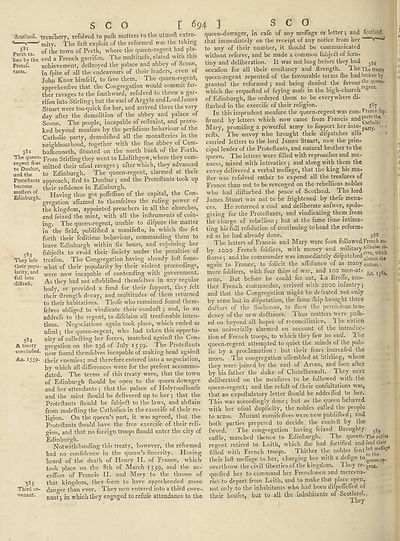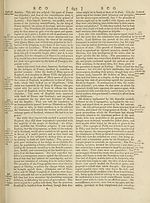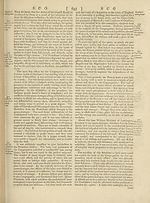Encyclopaedia Britannica, or, a Dictionary of arts, sciences, and miscellaneous literature : enlarged and improved. Illustrated with nearly six hundred engravings > Volume 18, RHI-SCR
(732) Page 694
Download files
Complete book:
Individual page:
Thumbnail gallery: Grid view | List view

SCO
[ 694 ]
SCO
-Scotland.
58i
Perth ta¬
ken by the
Protef-
tants.
582
The queen-
regent flies
to Dunbar,
and the
Proteftants
become
mafters of
Edinburgh.
583
They lofe
their popu
larity, and
fall into
diftrefs.
584
A treaty
concluded.
An. ISS9-
$85
Third co¬
venant.
treachery, refolved to puflt matters to the utmoft extre-
niity. The firll exploit of the reformed was the taking
of the town of Perth, where the queen-regent had pla¬
ced a French garrifon. The multitude, elated with this
achievement, deftroyed the palace and abbey of Scone,
in fpite of all the endeavours of their leaders, even of
John Knox himfelf, to fave thern. The queen-regent,
apprehenfive that the Congregation would commit far¬
ther ravages to the fouthvvard, refolved to throw a gar¬
rifon into'Stirling-, but the earl of Argyle and Lord James
Stuart were too quick for her, and arrived there the very
day after the demolition of the abbey and palace of
Scone. The people, incapable of reftraint, and provo¬
ked beyond meafure by the perfidious behaviour of the
Catholic party, demolilhed all the monafteries in the
neighbourhood, together with the fine abbey of Cam-
bulkenneth, fituated on the north bank of the Forth.
'From Stirling they went to Linlithgow, where they com¬
mitted their ufual ravages j after which, they advanced
to Edinburgh. The queen-regent, alarmed at their
approach, fled to Dunbar j and the Proteftants took up
their refidence in Edinburgh.
Having thus got poffeflion of the capital, the Con¬
gregation affumed to themfelves the ruling power of
the kingdom, appointed preachers in all the churches,
and feized the mint, with all the inftruments of coin¬
ing. The queen-regent, unable to difpute the matter
in the field, publifhed a manifefto, in which flie fet
forth their feditious behaviour, commanding them to
leave Edinburgh within fix hours, and enjoining her
fubje&s to avoid their fociety under the penalties of
treafon. The Congregation having already loft fome-
what of their popularity by their violent proceedings,
were now incapable of contending with government.
As they had not eftabliftied themfelves in any regular
body, or provided a fund for their fupport, they felt
their ftrength decay, and multitudes of them returned
to their habitations. Thofe who remained found them¬
felves obliged to vindicate their conduft ; and, in an
addrefs to the regent, to difclaim all treafonable inten¬
tions. Negociations again took place, which ended as
ufual -, the queen-regent, who had taken this opportu¬
nity of collefting her forces, marched againft the Con¬
gregation on the 23d of July 1559. The Proteftants
now found themfelves incapable of making head againft
• their enemies-, and therefore entered into a negociation,
by which all differences were for the prefent accommo¬
dated. The terms of this treaty were, that the town
of Edinburgh fliould be open to the queen dowager
and her attendants ; that the palace of Holyroodhoufe
and the mint (hould be delivered up to her ; that the
Proteftants {hould be fubjedl to the laws, and abftain
from molefting the Catholics in the exercife of their re¬
ligion. On the queen’s part, it w-as agreed, that the
Proteftants (hould have the free exercife of their reli¬
gion, and that no foreign troops {hould enter the city of
Edinburgh.
Notwithflanding this treaty, however, the reformed
had no confidence in the queen’s fincerity. Having
heard of the death of Henry II. of France, which
took place on the 8th of March 1559, and the ac-
ceflion of Francis II. and Mary to the throne of
that kingdom, they feem to have apprehended more
danger than ever. They now entered into a third cove¬
nant j in which they engaged to refufe attendance to the
queen-dowager, in cafe of any meffage or letter; and Scotland'
that immediately on the receipt of any notice from her
to any of their number, it {hould be communicated
without referve, and be made a common fubjedlof fcru-
tiny and deliberation. It was not long before they had 58(f
occafion for all their conftancy and ftrength. The The treaty
queen-regent repented of the favourable terms Ihe had broken by
granted the reformed j and being denied the favour *ee^‘een’
which {he requefted of faying mafs in the high-churchregen '
of Edinburgh, ftie ordered them to be everywhere di-
fturbed in the exercife of their religion. 587
In this imprudent meafure the queen-regent was con- Dance fup.
firmed by letters which now came from Francis^ and P0^1!®
Mary, promifing a powerful army to fupport her inte-party>
refts. The envoy who brought thefe difpatches alfo J
carried letters to the lord James Stuart, now the prin¬
cipal leader of the Proteftants, and natural brother to the
queen. The letters were filled with reproaches and me¬
naces, mixed with intreaties ; and alohg with them the
envoy delivered a verbal meffage, that the king his ma*
fter was refolved rather to expend all the treafures of
France than not to be revenged on the rebellious nobles
who had difturbed the peace of Scotland. The lord
James Stuart was not to be frightened by thefe mena¬
ces. He returned a cool and deliberate anfwer, apolo¬
gizing for the Proteftants, and vindicating them from
the charge of rebellion -, but at the fame time intima¬
ting his full refolution of continuing to head the reform¬
ed as he had already done. 588
The letters of Francis and Mary were foon followed French au-
by IOOO French foldiers, with money -and _ military
ft ores -, and the commander was immediately difpatched^^ ^
again to France, to folicit the afliftance of as many nation. ■
more foldiers, with four {hips of war, and 100 men-at- ^ ^
arms. But before he could fet out, La Broffe, ano¬
ther French commander, arrived with 2000 infantry,
and that the Congregation might be defeated not only
by arms but in deputation, the fame ftup brought three
doftors of the Sorbonne, to ftiow the pernicious ten¬
dency of the new doftrines. Thus matters were pufti-
ed on beyond all hopes of reconciliation. 1 he nation
was univerfally alarmed on account of the introduc¬
tion of French troops, to which they faw no end. The
queen-regent attempted to quiet the minds of the pub¬
lic by a proclamation : but their fears increafed the
more. The congregation affembled at Stirling, where
they were joined by the earl of Arran, and foon after
by his father the duke of Chatelherault. They next
deliberated on the meafures to be followed with the
queen-regent j and the refult of their confultations wras,
that an expoftulatory letter fliould be addrtffed to her.
This w'as accordingly done j but as the queen behaved
with her ufual duplicity, the nobles called die people
to arms. Mutual manifeftoes were now publiflied; and
both parties prepared to decide the conteft by the
fword. The congregation having feized Broughty ^
caftle, marched thence to Edinburgh. The queen-The nobles
regent retired to Leith, which ftie had fortified and fend their
filled with French troops. Thither the nobles fent1^™
their laft meffage to her, charging her with a defign to queen-re*
overthrow the civil liberties of the kingdom. I hey re-geot,
quelled her to command her Frenchmen and mercena¬
ries to depart from Leith, and to make that place open,
not only to the inhabitants who had been ditpoffeffed of
their houfes, but to all the inhabitants of Scotland.,
They
[ 694 ]
SCO
-Scotland.
58i
Perth ta¬
ken by the
Protef-
tants.
582
The queen-
regent flies
to Dunbar,
and the
Proteftants
become
mafters of
Edinburgh.
583
They lofe
their popu
larity, and
fall into
diftrefs.
584
A treaty
concluded.
An. ISS9-
$85
Third co¬
venant.
treachery, refolved to puflt matters to the utmoft extre-
niity. The firll exploit of the reformed was the taking
of the town of Perth, where the queen-regent had pla¬
ced a French garrifon. The multitude, elated with this
achievement, deftroyed the palace and abbey of Scone,
in fpite of all the endeavours of their leaders, even of
John Knox himfelf, to fave thern. The queen-regent,
apprehenfive that the Congregation would commit far¬
ther ravages to the fouthvvard, refolved to throw a gar¬
rifon into'Stirling-, but the earl of Argyle and Lord James
Stuart were too quick for her, and arrived there the very
day after the demolition of the abbey and palace of
Scone. The people, incapable of reftraint, and provo¬
ked beyond meafure by the perfidious behaviour of the
Catholic party, demolilhed all the monafteries in the
neighbourhood, together with the fine abbey of Cam-
bulkenneth, fituated on the north bank of the Forth.
'From Stirling they went to Linlithgow, where they com¬
mitted their ufual ravages j after which, they advanced
to Edinburgh. The queen-regent, alarmed at their
approach, fled to Dunbar j and the Proteftants took up
their refidence in Edinburgh.
Having thus got poffeflion of the capital, the Con¬
gregation affumed to themfelves the ruling power of
the kingdom, appointed preachers in all the churches,
and feized the mint, with all the inftruments of coin¬
ing. The queen-regent, unable to difpute the matter
in the field, publifhed a manifefto, in which flie fet
forth their feditious behaviour, commanding them to
leave Edinburgh within fix hours, and enjoining her
fubje&s to avoid their fociety under the penalties of
treafon. The Congregation having already loft fome-
what of their popularity by their violent proceedings,
were now incapable of contending with government.
As they had not eftabliftied themfelves in any regular
body, or provided a fund for their fupport, they felt
their ftrength decay, and multitudes of them returned
to their habitations. Thofe who remained found them¬
felves obliged to vindicate their conduft ; and, in an
addrefs to the regent, to difclaim all treafonable inten¬
tions. Negociations again took place, which ended as
ufual -, the queen-regent, who had taken this opportu¬
nity of collefting her forces, marched againft the Con¬
gregation on the 23d of July 1559. The Proteftants
now found themfelves incapable of making head againft
• their enemies-, and therefore entered into a negociation,
by which all differences were for the prefent accommo¬
dated. The terms of this treaty were, that the town
of Edinburgh fliould be open to the queen dowager
and her attendants ; that the palace of Holyroodhoufe
and the mint (hould be delivered up to her ; that the
Proteftants {hould be fubjedl to the laws, and abftain
from molefting the Catholics in the exercife of their re¬
ligion. On the queen’s part, it w-as agreed, that the
Proteftants (hould have the free exercife of their reli¬
gion, and that no foreign troops {hould enter the city of
Edinburgh.
Notwithflanding this treaty, however, the reformed
had no confidence in the queen’s fincerity. Having
heard of the death of Henry II. of France, which
took place on the 8th of March 1559, and the ac-
ceflion of Francis II. and Mary to the throne of
that kingdom, they feem to have apprehended more
danger than ever. They now entered into a third cove¬
nant j in which they engaged to refufe attendance to the
queen-dowager, in cafe of any meffage or letter; and Scotland'
that immediately on the receipt of any notice from her
to any of their number, it {hould be communicated
without referve, and be made a common fubjedlof fcru-
tiny and deliberation. It was not long before they had 58(f
occafion for all their conftancy and ftrength. The The treaty
queen-regent repented of the favourable terms Ihe had broken by
granted the reformed j and being denied the favour *ee^‘een’
which {he requefted of faying mafs in the high-churchregen '
of Edinburgh, ftie ordered them to be everywhere di-
fturbed in the exercife of their religion. 587
In this imprudent meafure the queen-regent was con- Dance fup.
firmed by letters which now came from Francis^ and P0^1!®
Mary, promifing a powerful army to fupport her inte-party>
refts. The envoy who brought thefe difpatches alfo J
carried letters to the lord James Stuart, now the prin¬
cipal leader of the Proteftants, and natural brother to the
queen. The letters were filled with reproaches and me¬
naces, mixed with intreaties ; and alohg with them the
envoy delivered a verbal meffage, that the king his ma*
fter was refolved rather to expend all the treafures of
France than not to be revenged on the rebellious nobles
who had difturbed the peace of Scotland. The lord
James Stuart was not to be frightened by thefe mena¬
ces. He returned a cool and deliberate anfwer, apolo¬
gizing for the Proteftants, and vindicating them from
the charge of rebellion -, but at the fame time intima¬
ting his full refolution of continuing to head the reform¬
ed as he had already done. 588
The letters of Francis and Mary were foon followed French au-
by IOOO French foldiers, with money -and _ military
ft ores -, and the commander was immediately difpatched^^ ^
again to France, to folicit the afliftance of as many nation. ■
more foldiers, with four {hips of war, and 100 men-at- ^ ^
arms. But before he could fet out, La Broffe, ano¬
ther French commander, arrived with 2000 infantry,
and that the Congregation might be defeated not only
by arms but in deputation, the fame ftup brought three
doftors of the Sorbonne, to ftiow the pernicious ten¬
dency of the new doftrines. Thus matters were pufti-
ed on beyond all hopes of reconciliation. 1 he nation
was univerfally alarmed on account of the introduc¬
tion of French troops, to which they faw no end. The
queen-regent attempted to quiet the minds of the pub¬
lic by a proclamation : but their fears increafed the
more. The congregation affembled at Stirling, where
they were joined by the earl of Arran, and foon after
by his father the duke of Chatelherault. They next
deliberated on the meafures to be followed with the
queen-regent j and the refult of their confultations wras,
that an expoftulatory letter fliould be addrtffed to her.
This w'as accordingly done j but as the queen behaved
with her ufual duplicity, the nobles called die people
to arms. Mutual manifeftoes were now publiflied; and
both parties prepared to decide the conteft by the
fword. The congregation having feized Broughty ^
caftle, marched thence to Edinburgh. The queen-The nobles
regent retired to Leith, which ftie had fortified and fend their
filled with French troops. Thither the nobles fent1^™
their laft meffage to her, charging her with a defign to queen-re*
overthrow the civil liberties of the kingdom. I hey re-geot,
quelled her to command her Frenchmen and mercena¬
ries to depart from Leith, and to make that place open,
not only to the inhabitants who had been ditpoffeffed of
their houfes, but to all the inhabitants of Scotland.,
They
Set display mode to:
![]() Universal Viewer |
Universal Viewer | ![]() Mirador |
Large image | Transcription
Mirador |
Large image | Transcription
Images and transcriptions on this page, including medium image downloads, may be used under the Creative Commons Attribution 4.0 International Licence unless otherwise stated. ![]()
| Permanent URL | https://digital.nls.uk/193028223 |
|---|
| Attribution and copyright: |
|
|---|
| Description | Ten editions of 'Encyclopaedia Britannica', issued from 1768-1903, in 231 volumes. Originally issued in 100 weekly parts (3 volumes) between 1768 and 1771 by publishers: Colin Macfarquhar and Andrew Bell (Edinburgh); editor: William Smellie: engraver: Andrew Bell. Expanded editions in the 19th century featured more volumes and contributions from leading experts in their fields. Managed and published in Edinburgh up to the 9th edition (25 volumes, from 1875-1889); the 10th edition (1902-1903) re-issued the 9th edition, with 11 supplementary volumes. |
|---|---|
| Additional NLS resources: |
|

